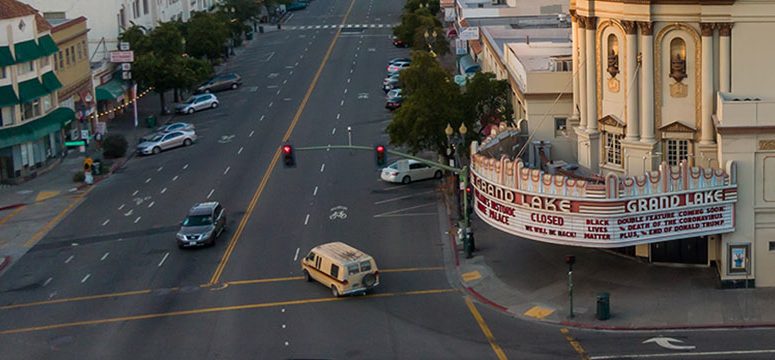 Many San Francisco bicyclists got their start by apparently taking this sign's message to heart. Flickr photo: mattymatt
Many San Francisco bicyclists got their start by apparently taking this sign's message to heart. Flickr photo: mattymattCould rounds of Muni service cuts and fare hikes push more people to start cycling in San Francisco?
The MTA, which operates Muni, doesn't have data on the phenomenon, but anecdotally, it's already happening.
For Christopher Janson, it wasn't the fare hikes last year or the service changes last December that nudged him towards commuting by bike: it was his daily ride three years ago on the 41-Union or the 45-Union-Stockton from Russian Hill to the Powell Street BART station.
"In the morning, the 41 would often be too full to stop and the 45 would be packed within three stops in Chinatown," Janson said. "In the evening, by the time I got back to the city ... again, both would be packed."
"It really was just not enjoyable riding Muni as a commuter," he added.
That daily frustration eventually helped him overcome nervousness about bicycling in the hills and on bustling streets. "Getting off of the bus and onto a bicycle has been incredible," said Janson. "I really think it is somewhat similar to learning how to drive a car. You just have to take it slow and easy at first and you gradually build up experience and become more confident."
Sean Rea, an Outer Sunset resident who commutes to a start-up in SOMA, began his transition from Muni to two-wheeled transportation last spring. He tired of waiting a half hour on occasion for the N-Judah, often finding it "packed like a sardine can" when it did arrive.
He describes himself as a "fair-weather, daylight cyclist," and on days when it's raining or he's in a hurry, he takes a scooter he purchased last May. "Working at a startup in SOMA has its perks, but a shower isn't one of them," said Rea. "Going from the Inner Sunset to SOMA isn't a trivial distance, and if it is wet and/or dark, or I'm on a time crunch, then there are parts of the route home that don't feel terribly safe."
He's open to biking even more if the MTA continues to make bicycling infrastructure upgrades that address his safety concerns.
For Jamie Whitaker, President of the Rincon Hill Neighborhood Association and a Harrison Street resident, it was when the price of the monthly Adult Fast Pass was raised from $45 to $60, and N-Judah service past Embarcadero station and 12-Folsom bus service east of 2nd Street were nixed last December.
"I stopped buying Muni Fast Passes and began using my flexible spending account's transit dollars to buy $60 of TransLink credit each month," said Whitaker. "I do not travel as much to other neighborhoods like Castro, Mission, and Bernal Heights as I used to, mainly because the lack of a Muni Fast Pass makes it -- psychologically, at least -- more expensive."
Whitaker said he actually biked more when he first moved to the city in 2004. At the time, he lived in Potrero Hill, and quickly found the 10-Townsend bus "wasn't terribly reliable for pick-ups at 17th and DeHaro at 6:30 in the morning for my commute over to 2nd Street and Brannan."
He soon bought a bicycle and rain or shine would bike to work downtown, where his office had a bike storage room and a shower. But when a new job came with a more formal dress code, a less-secure bike rack, and more flexibility about when he arrived, he made the switch back to the 10-Townsend.
Now that he lives in Rincon Hill, he's a full-time walker. Without a monthly pass, he's not riding Muni as much, and Rincon Hill hasn't upgraded its bike infrastructure to catch up with its flood of new residents yet, so he's not comfortable biking too often.
"I do hope to get into a habit of riding my bike more, just to expand my typical experiences once again beyond mid-Market/Civic Center, Fisherman's Wharf, and Mission Creek Park in Mission Bay," said Whitaker.
The cuts to the N-Judah and 12-Folsom have pushed a lot of his wealthier neighbors to drive more, Whitaker said.
That's why the San Francisco Bicycle Coalition (SFBC) is encouraging its members to protest Muni service cuts and fare hikes: some disgruntled Muni riders may switch to cycling, but plenty might switch to driving as well, creating more inhospitable conditions for bicycling and walking.
For Janson, who'd previously only biked in a tranquil college environment in less-hilly Indiana, the SFBC also helped make the transition to bicycling in the city easier.
"San Francisco is also a great place to learn because there are a ton of resources and a great cycling community," he said. "The single most important resource I own is the Bike Map that I got from the SFBC."
Neither Janson nor Rea give much thought to returning to Muni now, unless service is dramatically improved: both love the freedom and the affordability of bicycling. But Whitaker said he misses owning a monthly pass.
"I love to walk," he said, "but I do miss the freedom of the Muni Fast Pass to take me to other wonderful parts of San Francisco that I just don't feel like I can afford to see as often nowadays."





